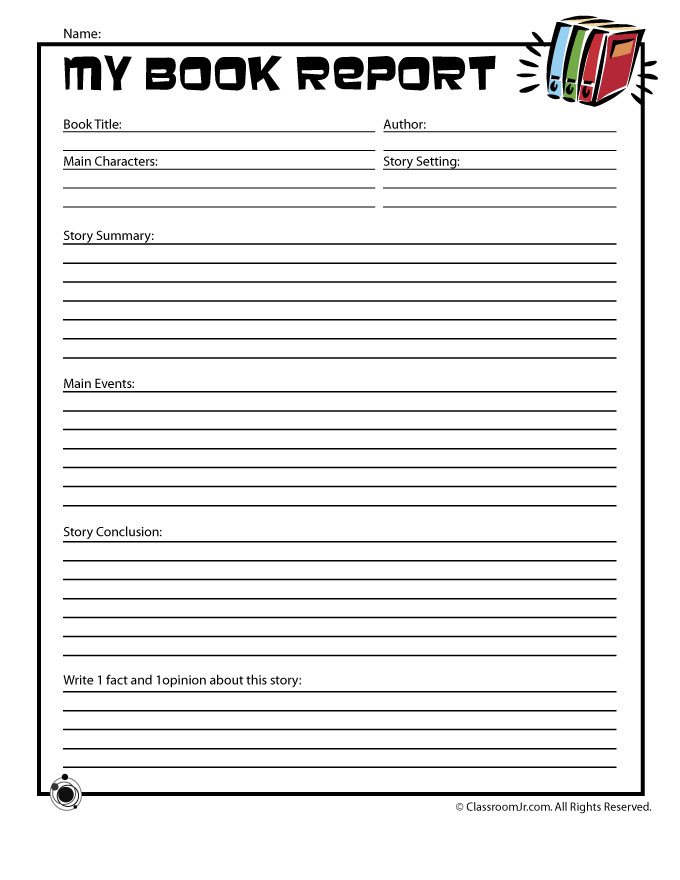
Use a Book Report Outline After reading the book, you are ready to start the writing process. When writing a book report, or when answering any writing prompt, you’ll find writing easier if you follow the proven steps of the writing process: prewriting, writing, revising, editing, and publishing. In the first step, prewriting, you’ll plan what you want to say. An outline is a great prewriting Writing a Book Report. Before You Read. Before you begin to read, consider what types of things you will need to write your book report. First, you will need to get some As You Read. When You Are Ready to Write. Revising/Final Copy Your academic work should include: The bibliographical information under the title of your academic paper. The intended audience of the book you are analyzing. The background information about the circumstances that led to the creation of the book. The subject (topic) of the book and the thesis
Book Reports // Purdue Writing Lab
This page is brought to you by the OWL at Purdue University. When printing this page, you must include the entire legal notice. All rights reserved. This material may not be published, reproduced, broadcast, rewritten, or redistributed without permission. Use of this site constitutes acceptance of our terms and conditions of fair use.
Book reports are informative reports that discuss a book from an objective stance. They are similar to book reviews but focus more on a summary of the work than an evaluation of it. Most often, book reports are a K assignment and range from to words. Book reviews are most often a college assignment, but they also appear in many professional works: magazines, newspapers, and academic journals, how to book report.
If you are looking to write a how to book report review instead of a book report, please see the OWL resource, Writing a Book Review. Before you begin to read, consider what types of things you will need to write your book report.
First, you will need to get some basic how to book report from the book:. You can either begin your report with some sort of citation, or you can incorporate some of these items into the report itself. While reading a work of fiction, keep track of the major characters. You can also do the same with biographies. When reading nonfiction works, however, look for the main ideas and be ready to talk about them, how to book report.
Announce the book and author. Then, summarize what you have learned from how to book report book. Explain what happens in the book, and discuss the elements you liked, did not like, would have changed, or if you would recommend this book to others and why. Consider the following items as well:. Find Info For Find Info For Academics Admissions Current Students Athletics About Careers Prospective Students Research and Partnerships Quick Links Apply News President Shop Visit Give Emergency.
Purdue Online Writing Lab College of Liberal Arts. Writing Lab Purdue OWL Research Contact Site Map. General Writing Common Writing Assignments. Welcome to the Purdue OWL This page is brought to you by the OWL at Purdue University.
Writing a Book Report Summary: This resource discusses book reports and how to write them.
When you write a report on a book you never read
, time: 3:03How to Write a Book Report: Step-by-Step Writing Guide

Jan 22, · Book report basics: In your first paragraph or two, you should include the book setting, time period, characters, and your thesis statement (objective). Re-visiting the introductory paragraph: The introductory paragraph should be the last paragraph you complete. It should be mistake-free and blogger.comted Reading Time: 5 mins Your academic work should include: The bibliographical information under the title of your academic paper. The intended audience of the book you are analyzing. The background information about the circumstances that led to the creation of the book. The subject (topic) of the book and the thesis Writing a Book Report. Before You Read. Before you begin to read, consider what types of things you will need to write your book report. First, you will need to get some As You Read. When You Are Ready to Write. Revising/Final Copy
No comments:
Post a Comment